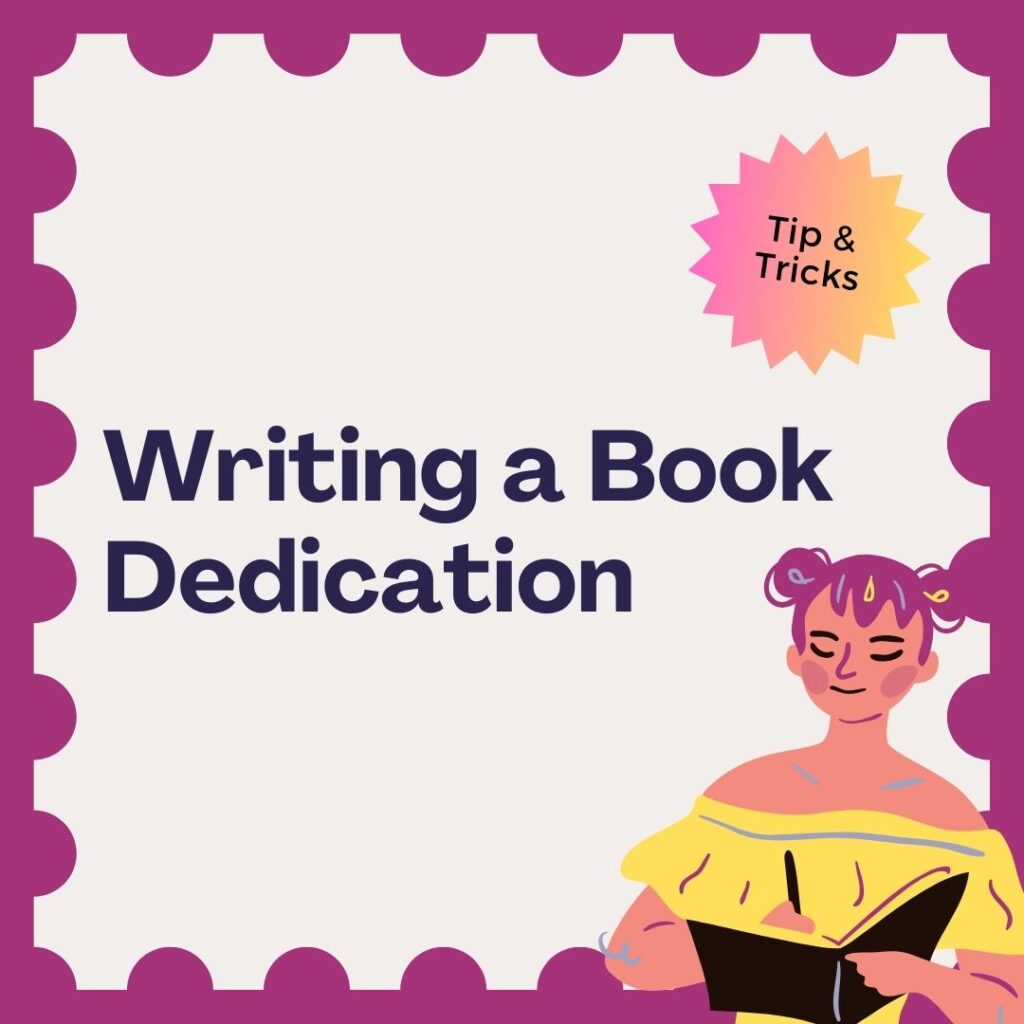Writing a Book Dedication: The Ultimate Guide for Authors
A book dedication is a heartfelt acknowledgment that allows authors to express gratitude to those who have inspired or supported them throughout their writing journey. While often brief, a well-crafted dedication can add a personal touch to your book and resonate with readers. This comprehensive guide will explore the significance of book dedications, provide tips for writing one, and share examples to inspire your dedication.

Table of Contents
What is a Book Dedication?
A book dedication is a short statement located at the beginning of a book, typically on its own page, where the author expresses gratitude to specific individuals or groups who have influenced or supported their writing.
Key Features of a Book Dedication:
- Concise: Usually just a few sentences long.
- Personal: Reflects the author’s feelings and relationships.
- Visible: Appears before the main text, often after the title page.
The Purpose of a Dedication
Book dedications serve several important purposes:
- Acknowledgment: They allow authors to thank those who have played a significant role in their writing journey.
- Connection: A dedication can create an emotional bond between the author and readers by sharing personal insights.
- Setting the Tone: The style and content of the dedication can set the tone for the book that follows.
Choosing Who to Dedicate Your Book To
Selecting the right person or group for your dedication is crucial:
Family and Friends
Many authors choose to dedicate their books to family members or close friends:
- Consider dedicating your work to someone who has provided emotional support or encouragement throughout your writing process.
Example:
For my mother, whose love of stories inspired me to write.
Mentors and Influencers
If you have had mentors or influential figures in your life:
- Acknowledge those who have guided you or shaped your writing style.
Example:
To my professor, Dr. Smith, whose insights opened my eyes to the world of literature.
Inspirational Figures
You may want to dedicate your book to someone whose work has inspired you:
- This could be an author, artist, or public figure whose influence is evident in your writing.
Example:
In memory of Maya Angelou, who taught me the power of words.
Causes and Ideas
Some authors choose to dedicate their work to causes or ideas they are passionate about:
- This can reflect your values or highlight issues that resonate with you.
Example:
To all those fighting for equality and justice around the world.
Crafting Your Dedication
Once you’ve chosen who to dedicate your book to, it’s time to craft your dedication:
Keeping it Personal
Your dedication should reflect your genuine feelings:
- Use language that resonates with you; this adds authenticity.
Example:
For my partner, who believed in me even when I didn’t believe in myself.
Deciding on Tone and Style
Consider the overall tone of your book when writing your dedication:
- If your book is humorous, you might choose a lighthearted tone; if it’s serious, opt for something more heartfelt.
Example:
To my best friend—thanks for being my unpaid therapist!
Length and Structure
Dedications can vary in length but should generally be concise:
- Aim for one to three sentences; avoid lengthy paragraphs that may dilute the message.
Example Structure:
- Start with “For” or “To” followed by the name(s) of the dedicatee(s).
- Include a brief reason if desired.
Examples of Book Dedications
Here are some examples from well-known authors that illustrate different styles and tones:
Example from Fiction:
For my father, who taught me that stories are everywhere.
Example from Non-Fiction:
To my grandmother, whose wisdom shaped my understanding of life.
Example from Poetry:
Dedicated to those who dream beyond what is visible.
Common Mistakes to Avoid
When writing your dedication, be mindful of these common pitfalls:
- Overcomplicating It: Keep it simple; don’t feel pressured to write an elaborate dedication.
- Being Too Generic: Avoid vague dedications that lack personal connection; specificity makes it more meaningful.
- Neglecting Audience Consideration: Remember that readers will see this; ensure it aligns with the overall tone of your book.
The Role of Dedications in Different Genres
The approach to dedications can vary by genre:
Fiction
In fiction, dedications often reflect personal relationships or inspirations relevant to character development.
Non-Fiction
In non-fiction works, dedications may acknowledge mentors or influences related directly to the subject matter.
Poetry
Poets often use dedications as an opportunity for emotional expression, sometimes incorporating humor or deep sentiment.
Finalizing Your Dedication
After crafting your dedication, take time to review it:
- Ensure it reflects your true feelings and intentions.
- Consider seeking feedback from trusted friends or colleagues before finalizing it.
FAQs
What is a book dedication?
A book dedication is a brief section at the beginning of a book where the author expresses gratitude or acknowledges a person or group who has significantly influenced or supported them. It can be as simple as “To my mother” or more elaborate, often reflecting the author’s personal connection to the dedicatee.
Who can I dedicate my book to?
You can dedicate your book to anyone who has inspired or supported you during your writing journey. Common choices include family members (spouse, children, parents), friends, mentors, or even places that have inspired your work. The dedication should feel personal and meaningful to you.
How long should a book dedication be?
Most book dedications are short and concise, typically consisting of just a few lines. While there is no strict limit, it’s best to keep it succinct and focused on the person or people you are honoring.
Where does the dedication page go in a book?
The dedication page usually appears at the very front of the book, following the title page and copyright page. It is typically placed before any preface or foreword.
Do I need to include a book dedication?
Including a dedication is entirely optional. While many authors choose to add one as a personal touch, it is not mandatory. If you feel strongly about dedicating your book, go ahead; if not, you can skip it.
How should I format my book dedication?
There are no strict formatting rules for dedications, but they are generally centered on the page and may be set in a slightly larger font than the main text. You can start with “To…” or “For…” followed by the name of the person or group you are dedicating the book to.
Can I use humor in my dedication?
Yes! Depending on the tone of your book and your relationship with the dedicatee, you can incorporate humor into your dedication. This can help set the tone for your work and give readers insight into your personality.
Should I consider my readers when writing a dedication?
While your primary focus should be on the person or people you are dedicating the book to, it’s also wise to consider how your readers might perceive it. A well-crafted dedication can enhance their connection to you as an author and provide context for your writing.
Can I change my dedication after writing my book?
Yes! There’s no rule that says you must finalize your dedication before completing your manuscript. You can write it at any point during your writing process and revise it as needed until publication.
Are there examples of creative book dedications?
Absolutely! Many authors have unique and memorable dedications that reflect their style and relationship with their dedicatees. Reading various examples can inspire you and help you find the right tone for your own dedication.
Conclusion
Writing a book dedication is an opportunity for authors to express gratitude while creating an emotional connection with their readers! By understanding its importance—choosing meaningful subjects while avoiding common mistakes—you’ll be well-equipped to craft heartfelt dedications that resonate deeply!
Discover marketing services, interviews & publishing tools at SharingStories.




